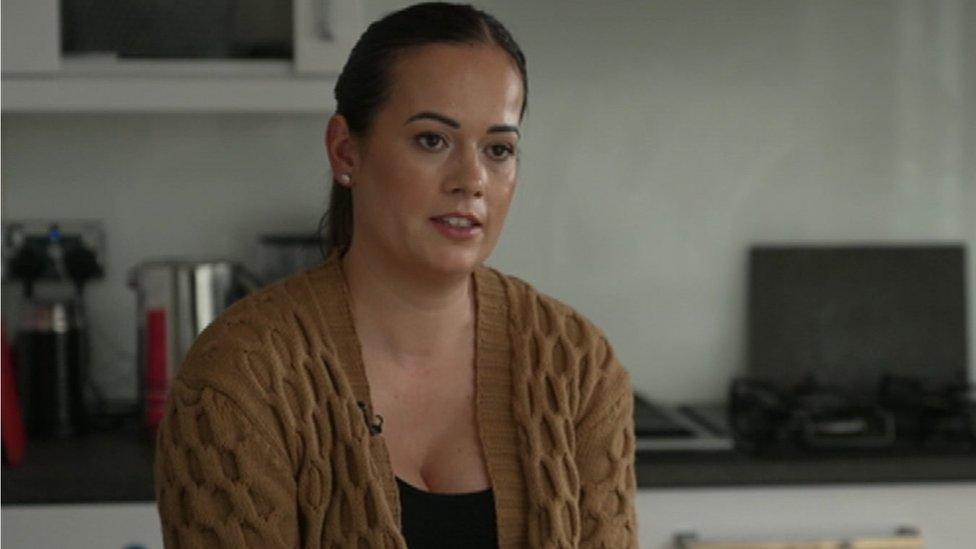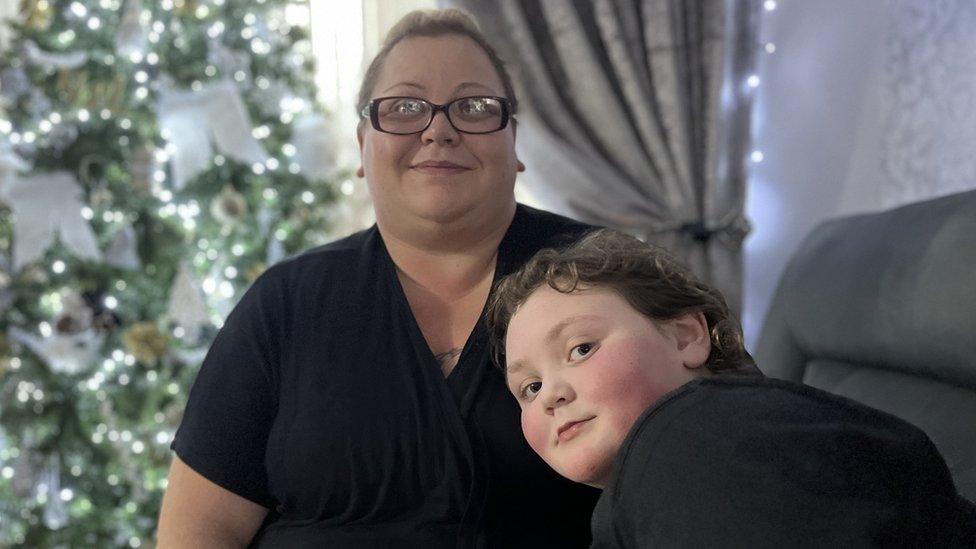Bexley mother 'burnt out' in fight for son's special educational needs
- Published

Gemma Ekrem has called for more money to be put into special education provision
A mother in south-east London says she feels "burnt out" from having to "fight" for an education that meets the needs of her son.
Gemma Ekrem's son Harley, six, has special educational needs (Sen). She is taking Bexley Council to a tribunal to access a specialist school for him.
The council said it has "supported Ms Ekrem's family and will continue [to]".
She is among a growing number of parents taking councils to tribunal across London over Sen provision.
Ms Ekrem's three children previously attended a primary school in Bexley but she said she felt unable to return after Harley ran out of the school gates and into a busy road.
His elder brother, Hayden, then chased after him and managed to get him to safety, but Ms Ekrem said the incident had left her traumatised.
"I just thought my son was dead. I thought two sons could possibly have been dead," she said.
"I couldn't face going back to the school. I associate that road with the road where my son nearly died and so do my kids."
However, Ms Ekrem was then threatened with legal action from Bexley Council if her children did not return to the school.

Harley's mum says he would "thrive" in a specialist school
Harley has complex educational needs - he is autistic, has global development delay and ADHD, as does her eldest son Ethan.
Both children have an Educational Health Care Plan (ECHP) - a document outlining a child's special educational, health, and social care needs and the support required to meet them.
Ms Ekrem asked Bexley Council to provide a home tutor for all her sons on the grounds the authority has a statutory duty to provide an education if the children have not been in school for 15 days.
'He'd thrive at specialist school'
While her eldest two children started at new schools, it took seven months for Harley to get a tutor. Yet Ms Ekrem believes it is clear he needs to be in a specialist school with his ECHP requiring to be changed.
"Harley doesn't associate home with school so getting him to engage with his tutor is really hard work," she said.
"His routine is all over the place. If he was at a specialist school he would be thriving."
There is only one specialist school in the borough and it has a long waiting list.
Ms Ekrem is now facing the prospect of taking Bexley Council to a tribunal to amend his EHCP which could take at least a year, adding to the pressure she says she is facing.
"We're a carer for our kids, we're their advocate, their voice, their teacher and everything built in and a lot of us have no energy, we're burnt out," she said.
A Bexley Council spokesperson said: "We believe that education is vital to our children and young people and it is because of this that officers from a number of departments have been in contact with Mrs Ekrem over the past few months.
"We are keen to address Mrs Ekrem's concerns and would welcome the opportunity to meet with her to discuss them."

Increasing numbers of families are taking councils to tribunals
Ms Ekrem is not alone in taking her local council to a tribunal.
Figures reveal record numbers of parents are using legal tribunals to challenge councils' decisions made about their children with special educational needs and disabilities (Send).
Schools in England must provide support to children with special educational needs and if a child needs more support than a school can provide, they may qualify for an EHCP.
In 2015, a year after Send reforms were introduced, 909 Send tribunal appeals were made in London. By 2022, that figure had almost doubled in London, with 1,638 appeals made in the capital.
It is a similar case across England. By the end of last year 13,658 families in England had registered an appeal - a rise of 24% from the year before - while of the 7,986 decisions that made it through to a tribunal, 7,829 ruled in favour of those making the appeal.
This equates to a council success rate of just 1.7%
The Liberal Democrat education spokesperson and MP for Twickenham Munira Wilson said EHCPs were being rationed by local authorities because of the growing demand and the lack of resources.
"There is a real pressure at the local level and the fact that schools have to pay the first £6,000 towards an EHCP that is a disincentive to identify children early," she said.
The MP also described the Sen system as "broken", adding that the "£100m" which has been spent on tribunals is "money that could be spent on Send provision".
Councillor Louise Gittins, chair of the Local Government Association's children and young people board said councils "fully recognise the right of families to take appeals to tribunals".
She said the gap between the cost of Send support and available funding is about £1.9bn and urged the government to write off "high needs deficits" in council budgets.
'Ambitious reforms'
A Department for Education spokesperson said that while the "vast majority" of EHCPs are put in place without resorting to tribunals, "the system needs to work better for parents".
They said the government has set up "ambitious reforms to the system" including plans for strengthened mediation between parents and councils before cases go to tribunals as well as the creation of "consistent, high-quality national standards".
The spokesperson added that funding for children and young people with complex needs will reach over £10.5 billion in 2024-25 - an increase of over 60% since 2019-20.

Listen to the best of BBC Radio London on Sounds and follow BBC London on Facebook, external, X, external and Instagram, external. Send your story ideas to hello.bbclondon@bbc.co.uk
Related topics
- Published2 March 2023

- Published14 December 2023
